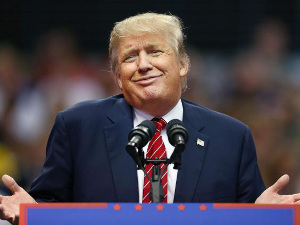Last week, there were reports that the Department of Homeland Security (DHS) was planning to ban all laptops and tablets on planes coming out of the European Union related to a suspected ISIS plot. This was apparently also a topic of discussion in President Trump’s meeting with Russian Foreign Minister Sergey Lavrov.
 That fact in and of itself isn’t anything too important: the speculation of a laptop bomb plot dates back months. Rather, some “current and former” US officials say President Trump revealed “top secret” informant about the ISIS plot and how the US came by it.
That fact in and of itself isn’t anything too important: the speculation of a laptop bomb plot dates back months. Rather, some “current and former” US officials say President Trump revealed “top secret” informant about the ISIS plot and how the US came by it.
This apparently came in the form of Trump revealing that the intelligence came from a source in a certain ISIS city, which was not named in the media reports on it, but apparently which some US officials believe could be used to identify the source by the Russians, if they so choose. Officials subsequently publicly identified the nation that was the source as Israel, meaning they were so angry at Trump telliing Russia that they told everybody.
Obviously, Russia doesn’t like ISIS any more than the US does, and would have no reason to share this information with ISIS, though such common sense appears lacking in the endless and wildly speculative US hostility toward Russia.
Indeed, media speculation was rampant on the revelation, making the jump from the US having a foreign source in a certain ISIS city to the idea that same source, working for Israel might conceivably provide the US with information against Assad some day, and then concluding that Russia “would be keenly interested” in disrupting the source if that happens.
The White House immediately denied that any untoward disclosures occurred, insisting that the only information given to Russia was information that was already “publicly available” on the already well-publicized plot. President Trump, however, admitted to the disclosures on Twitter, insisting that as president he can do what he wants.
The same group of officials who were warning Trump against being on good terms with Russia insisted that today’s revelations were “shocking” and suggested they’d have far-reaching consequences for national security, even if they were consequences they didn’t seem able to specifically identify.
In practice the fallout will likely take place wholly in the media, for while several reports claimed Trump revealed things “he did not have permission to share,” legally speaking that’s not true at all, and the President has broad discretionary power on revealing classified information, meaning even if he did ultimately name a city, there is no legal ramification for having done so.


